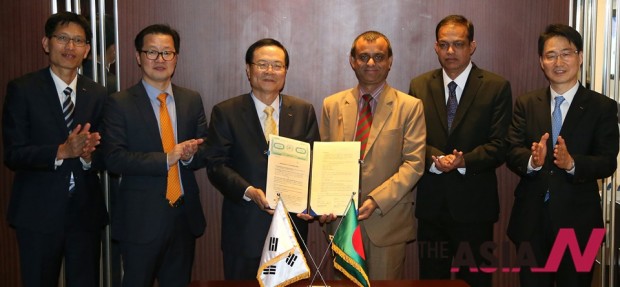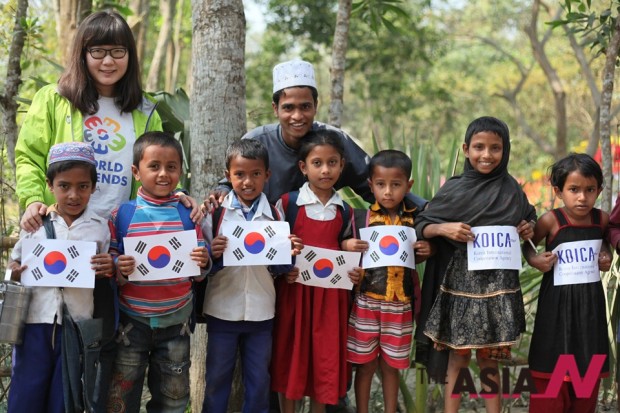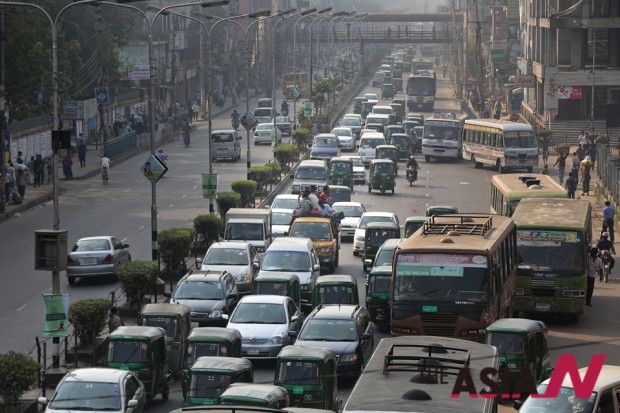[해외기고] 영원무역·현대건설 등 한국기업, 방글라데시 진출 ‘활발’
* ‘아시아엔’ 해외필진 기고문의 한글요약본과 원문을 함께 게재합니다.
[샤피쿨 바샤르 아시아기자협회(AJA) 방글라데시 지부장·번역 김아람 기자] 1972년 한국과 방글라데시가 수교한 이래로 양국 교류는 나날이 발전을 거듭해왔다. 특히 한국은 방글라데시의 중요한 경제 파트너로 손꼽힌다. 현재 방글라데시의 수출가공구역(이하 ‘EPZ’)에 진출해 있는 한국 기업은 80곳이 넘으며, 양국 합작사업만 수백 건에 달한다.
EPZ는 방글라데시의 효자 노릇을 톡톡히 하고 있다. EPZ는 정부가 지정한 특별 경제구역으로, 외국 기업들은 무료로 입주할 수 있다. 기업들이 활발히 입주한 덕분에 현지 고용창출도 증대되면서 경제활성화에 큰 도움이 되고 있다. 의류나 신발, 섬유, 유리, 화학, 건축, 전기 등 여러 부문의 한국 기업들이 진출해 있는데, 그 중에서도 최대 규모를 자랑하는 곳은 ‘영원무역’이다. 5만에 가까운 직원을 고용하고 있는데다가 제품 생산의 70%를 방글라데시에 의존하고 있다.
‘현대건설’도 건설 및 인프라 부문에서 큰 역할을 해오고 있다. 1991년 방글라데시 최장교량으로 손꼽히는 ‘자무나대교’를 완공했으며, 2011년에는 3억4천만달러(4천억원) 규모의 복합화력발전 공사를 수주했다. 2012년에는 15억5천만달러(1조8천억원) 규모의 방글라데시 상하수도 설계 계획을 수립해양해각서(MOU)도 체결한 바 있다. 이밖에도 다수의 한국 기업들이 방글라데시 전력 사업 등 인프라에 적극 투자하고 있다.
양국은 정부차원에서의 교류도 활발히 벌이고 있다. 양국 정부는 수년전 한국-방글라데시 상공회의소(KBCCI)를 설립했다. KBCCI는 향후 코트라(KOTRA)와 협력해 양국 교류의 교두보 역할을 톡톡히 해낼 전망이다.
이처럼 한국기업들이 방글라데시에 활발히 진출한 이유는 무엇일까? 방글라데시는 저렴한 노동력과 천연가스, 비옥한 토지 등 풍부한 자원을 바탕으로 해외 기업들의 이목을 사로잡았다. 또한 아시아 중앙에 위치해 바다와 맞닿아 있는 지리적 이점은 물류허브로 각광받고 있다. 방글라데시는 연 경제 성장률이 6~7%에 달하는 등 내수경제도 성장세를 보이고 있어 더욱 매력적인 투자시장으로 떠오르고 있다.

Dhaka-Seoul Economic Cooperation Continues To Grow
Republic of Korea recognized Bangladesh as an independent and sovereign country in May 1972 and established diplomatic relations with Dhaka. Since then the two countries have been enjoying excellent bilateral relations while economic cooperation between them continues to grow day by day. Bilateral trade volume has been increasing and hundreds of Korean entrepreneurs have invested in different industries in Bangladesh. Thousands of Bangladeshi workers are employed in South Korean establishments and a large number of Bangladeshi students are studying at educational institutions there. People to people contact between the two countries has also been expanding through exchange of cultural troupes and visits of delegations of different sectors. South Korea is now considered as an important development partner of Bangladesh.
Korean investment in Bangladesh
Hundreds of joint ventures or full ownership Korean firms are operating outside or inside Export Processing Zones (EPZs) in Bangladesh controlled by the government. Bangladesh has eight EPZs where hundreds of industrial establishments are in operation. These industries in EPZs enjoy special facilities and protection provided by the government. Foreign companies are free to set up industries in the EPZs with 100% ownership or under joint venture with Bangladeshi entrepreneurs. At present, more than 80 Korean companies have set up their industrial units in EPZs in Bangladesh as well. These companies are operating in the sectors like ready-made garments (RMG), textiles, glass and ceramic, leather garments and footwear, RMG accessories, chemical products, electronics, IT, and construction materials. These companies have created employment opportunities for large number of Bangladeshi people and also contributing significantly for the development of Bangladesh economy.
The largest of the Korean Investors in Bangladesh is Youngone Corporation. It is operating in Chittagong EPZ in the fields of RMG, RMG accessories, footwear, and leather goods, and is employing almost 50,000 people. Apart from that, Youngone is trusted with developing a private export-processing zone, the first of its kind, in Chittagong. Dada Ltd., Pacific Zipper, and the HHH accessories industries are few too many to mention.
Samsung Electronics has established a research center in Bangladesh where several hundred engineers and researchers are working. Samsung reportedly has a plan to establish a factory in Bangladesh to produce electronic goods in the near future.
The presence of Korean companies in the construction and infrastructure sector in Bangladesh is also noticeable. Hyundai Engineering and Construction Co. Ltd. constructed the 4.8 km-long Bangabandhu Bridge on the Jamuna river, which is still the largest bridge in Bangladesh. Korean companies are actively participating in power generation and transmission projects as well.

Future prospect of Korean investment
Bangladesh is strategically located for global trade with access to international sea and air routes, and is endowed with an abundant supply of the key factors of production, like a hardworking workforce, natural gas, sweet water, fertile land, favorable climate, and social tranquility. Bangladesh offers a large domestic market of about 160 million people with purchasing power continuously growing due to continuous and accelerating growth in national income. Apart from the local market, most Bangladeshi products enjoy duty and quota-free access to the developed countries including European Union, United States, Canada, Australia, New Zealand and others. In such a scenario, South Korea has certainly vast scope to invest more in Bangladesh which would bring benefit for both the countries.
According to sources in the Federation of Bangladesh Chamber of Commerce and Industries (FBCCI), the scope for profitable investment in Bangladesh is enormous, and the list of potential sectors for South Korean investment can be quite long. In this regard, they mentioned some sectors where Korean investors can keep their eyes on for tapping the opportunity. The proposed sectors include: ready-made garments (RMG) sector, textile and home textiles, active pharmaceuticals ingredient and radio pharmaceuticals industry, ICT products & ICT-based services, shipbuilding, environmentally-friendly ship breaking industry, agro-based industry/ food processing industry, frozen fish industry, jute-based industry and leather industry. Scope exists to invest also in many Public Private Partnership (PPP) projects of large infrastructure such as roads, bridges, airports, township, ICT infrastructure and others. Other possible projects for investment include, renewable energy or solar power sector, tourism and hospitality sector, polymer-making industry, hospitals and clinics, automobiles, electrical home appliances, and the light engineering industry.
KBCCI to promote bilateral trade, investment
Korea Bangladesh Chamber of Commerce and Industry (KBCCI) was formed several years ago with the participation of both Bangladeshi and South Korean investors and businessmen. It was formed when the extreme need was felt for starting a new trade regime with the stronger mutual presence in each other markets. It was possible to form KBCCI with the direct support and cooperation of KOTRA, which is operating for trade and investment promotion in Bangladesh as Korean government agency for the last 35 years. At present KBCCI is playing a major role for the promotion of trade and investment between Bangladesh and South Korea. Thus the KBCCI can be described as the bridge between the business communities of the two countries which contributes significantly to strengthen bilateral economic cooperation.






